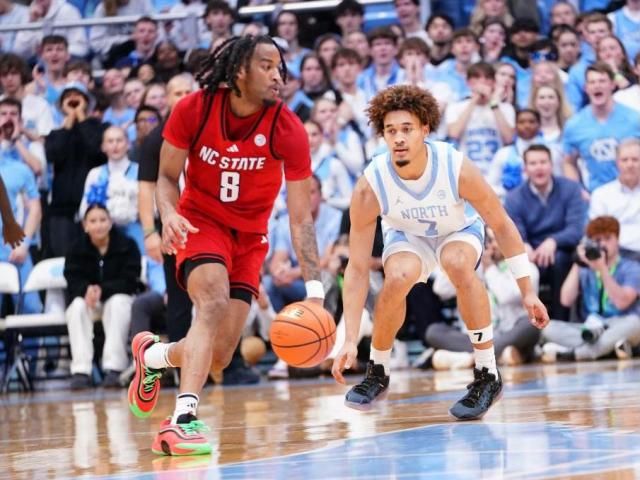## Wake Up, Heels and Wolfpack! Your Game Day Just Got Wilder.
A new budget battle is brewing in North Carolina, and this time, the stakes are higher than ever. Forget the basketball court, the real action is happening in the state Senate. They’ve just dropped a bombshell: UNC and NC State are getting mandated to play more in-state teams, and get this – they’re doubling down on sports betting taxes!

Tax Rate Hike

The proposed budget doubles the sports betting tax rate from 18% to 36%, placing North Carolina among the highest taxing states for sports wagering. This significant increase is projected to generate substantial revenue for the state, but its impact on sports bettors remains unclear.

Impact on Sports Betting Industry
The Sports Betting Alliance, representing major operators like DraftKings and FanDuel, declined to comment on the proposed tax increase. The industry’s response is crucial as it could impact investment decisions and potentially influence the competitiveness of the North Carolina sports betting market.

Comparison to Other States
With a 36% tax rate, North Carolina would join a select group of states with high sports betting taxes, including:
- New York (51%)
- New Hampshire (51%)
- Delaware (50%)
- Illinois (up to 40%)
- Pennsylvania (36%)
The potential for higher taxes in North Carolina could impact consumer behavior and incentivize sports bettors to seek out more favorable tax structures in neighboring states.

Industry Reaction
The proposed tax increase has sparked mixed reactions from stakeholders in the sports betting industry. While some operators may be willing to absorb the higher costs, others may choose to scale back operations or even exit the North Carolina market. The long-term impact on consumer choice and market competition remains to be seen.
Potential Implications for Operators
Increased tax rates can significantly impact profitability for sports betting operators. To offset the higher costs, operators may:
- Increase customer acquisition costs through aggressive marketing campaigns.
- Reduce their payouts to customers by lowering odds.
- Limit the number of betting markets offered.
- Consider exiting the North Carolina market altogether.
The decision of individual operators will depend on a variety of factors, including their financial resources, market share, and overall business strategy.
Taxpayer Impact
While the increased tax revenue will benefit the state, the impact on sports bettors is less clear-cut. On one hand, higher taxes could lead to reduced consumer choice and potentially higher prices for betting services. On the other hand, the increased revenue could be used to fund important public services and infrastructure projects.
Weighing the Pros and Cons
The potential impact of the tax increase on taxpayers should be carefully considered. A balanced approach that maximizes revenue generation while minimizing the burden on consumers is crucial for the long-term success of the sports betting industry in North Carolina.
Beyond the Court: The Political Landscape
This budget proposal reflects a complex interplay of political considerations and priorities. The inclusion of provisions related to sports betting and the children’s hospital highlights key issues that are shaping the legislative agenda in North Carolina.
Berger’s Priorities
Senate leader Phil Berger, a key figure in pushing for the budget, emphasized the importance of the children’s hospital and the expansion of sports betting revenue. His focus on these two areas suggests a strategic alignment with public health initiatives and economic development goals.
Certificate-of-Need Debate
The proposal to remove certificate-of-need requirements for the children’s hospital is likely to spark controversy and intense political debate. Opponents argue that such a move could lead to higher healthcare costs and a decline in quality of care. Supporters contend that it will expedite the development of much-needed pediatric services in the state.
Negotiations Ahead
The House of Representatives will now review the Senate’s budget, leading to negotiations and potential revisions before a final budget is approved. The outcome of these negotiations will determine the fate of the proposed changes to the sports betting tax rate and the certificate-of-need requirements for the children’s hospital.
Conclusion
The recent Senate budget mandates are shaking up the world of college athletics and gambling in North Carolina. By forcing UNC and NC State to prioritize in-state matchups, the legislature is sending a clear message: support for local sports transcends national competition. This move promises to invigorate the state’s athletic landscape, fostering deeper rivalries and generating a renewed sense of community pride.
But it’s not just on the gridiron where things are changing. The doubling of the sports betting tax signifies a calculated shift in the state’s approach to gambling. While the move aims to generate significant revenue, its long-term impact on the burgeoning sports betting industry remains to be seen. Will it stifle growth or simply lead to a more regulated and sustainable market? Only time will tell. These budget decisions, however, undeniably mark a turning point, forcing us to confront the evolving relationship between entertainment, competition, and the role of public policy in shaping it.
